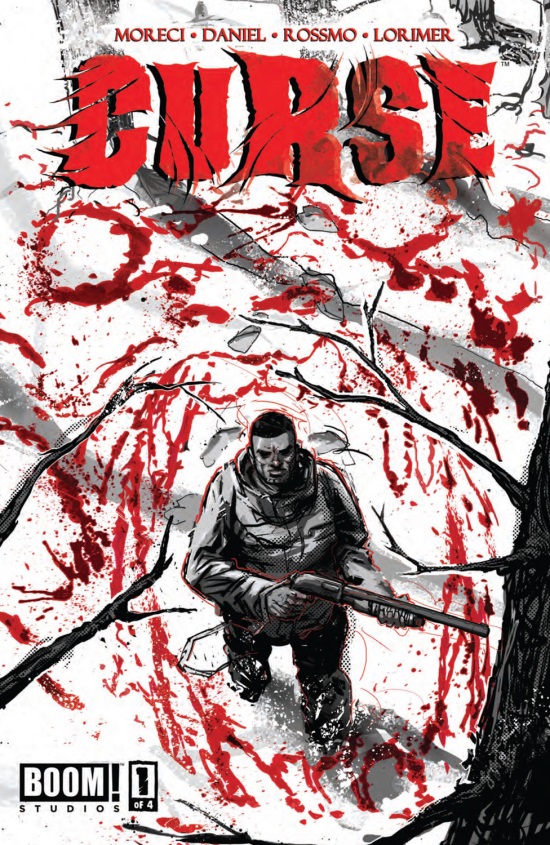Directed by Haim Tabakman
Written by Merav Doster
Israel | Germany | France – 2010
Showing at Cinéma du Parc in its second run in Montreal following last year’s limited release, Haim Tabakman’s ‘Eyes Wide Open’ is so overwhelmingly a limited-appeal, art-house offering as to seem almost destined for festival success.
This ineffably implausible man-and-man romance tentatively unfolds deep in the heart of Mea Shearim, Jerusalem’s ultra-Orthodox neighbourhood, where Aaron (played by the wistfully bearded Zohar Strauss) a Hassidic father-of-many assumes the stewardship of the familial butcher shop after the recent death of his father and hesitantly hires an assistant in the person of Ezri, a stray, toothsome, puppy-eyed yeshiva dropout with a risky-yet-oh-so-enticing penchant for same-sex friendship.
Ezri, the driving force behind the tortuous romance, is in pious Aaron’s own words a masterpiece of G-d’s creation, crossing righteous men’s paths so as to anneal their faith in the face of temptation (which Ran Danker’s model white-hot looks and excess charisma excellently convey). While Ezri is from the outset framed as driven by same-sex longing (moving to Jerusalem for and pursing in vain a former blind yeshiva flame who sanctimoniously rejects him presumably in the name of G-d), Aaron makes the unlikeliest of male romance converts – and the film almost falters as the audience tenuously gives credit to the slow-burning, meat-shop conversion. And from here on the exquisitely-filmed, ominously ardent goings-on in Jerusalem’s backstreet butcher shops defy most audiences’ expectations of realism and on-screen plausibility.
paths so as to anneal their faith in the face of temptation (which Ran Danker’s model white-hot looks and excess charisma excellently convey). While Ezri is from the outset framed as driven by same-sex longing (moving to Jerusalem for and pursing in vain a former blind yeshiva flame who sanctimoniously rejects him presumably in the name of G-d), Aaron makes the unlikeliest of male romance converts – and the film almost falters as the audience tenuously gives credit to the slow-burning, meat-shop conversion. And from here on the exquisitely-filmed, ominously ardent goings-on in Jerusalem’s backstreet butcher shops defy most audiences’ expectations of realism and on-screen plausibility.
Aaron, who eagerly objects to his rabbi’s almost incredulously hedonistic teachings – G-d does not want you to be unhappy, he wants you to enjoy life!- seems almost too easy a prey for Ezri’s bulldozer charisma.
 And indeed, while the plot offers a virtually limitless potential for veering into prurient, melodramatically-laden potholes, the demure, impeccable performances and the piercing lyricism of the cinematography – for what film has ever captured so ponderous yet meaningful a mikveh!- not only manage to pull off this unlikeliest of couplings, but by the end of the film the audience finds itself transcending all disbelief and prejudice and hopelessly rooting for the doomed romance.
And indeed, while the plot offers a virtually limitless potential for veering into prurient, melodramatically-laden potholes, the demure, impeccable performances and the piercing lyricism of the cinematography – for what film has ever captured so ponderous yet meaningful a mikveh!- not only manage to pull off this unlikeliest of couplings, but by the end of the film the audience finds itself transcending all disbelief and prejudice and hopelessly rooting for the doomed romance.
While the plot itself is as old as art – doomed, impossible romance – the mere feat of braving to treat the taboo subject matter and represent ‘gay’ Mea Shearim in such a sober, realistic and grown-up yet wishful manner is in itself a first.
Immensely surpassing previous Hassidic homosexual offerings – namely the unbearably titillating lesbian drama ‘HaSodot’ and the very secular, very good-looking rave-in-Tel-Aviv ‘HaBuah’, ‘Eyes Wide Open’ wades bashfully, uncomfortably, yet uncompromisingly and courageously into hitherto uncharted territory. The furthest limit that mainstream Israeli cinema had hitherto ventured into Hassidic sexuality – Amos Gitai’s infertility drama ‘Kadosh’- has just been breached with hardly so much as an awkward avowal. The simple but definitive, unappealable “I was dead. Now I am alive” is all Aaron’s supremely dignified character deigns to riposte as justification to his rabbi’s question as to why it is so hard to let go of the ruinous young man.
Fast-forward the various predictable morality squad interventions, the rabbi’s vain attempts at restoring piety and salving Aaron’s family’s honour, the neighbourhood’s  multitude of foreboding slurs, ‘Eyes Wide Open’ inexorably yet quietly, discreetly makes its way to the tragically inevitable, filmically sublime climax.
multitude of foreboding slurs, ‘Eyes Wide Open’ inexorably yet quietly, discreetly makes its way to the tragically inevitable, filmically sublime climax.
In a closing sequence of exceptionally demure beauty, in a matter of a few subdued, heart-wrenching seconds and a mikveh-immersion unlike any witnessed on film, the characters’ destinies not only transcend the petty Talmudic quibbles, neighbourhood stigmatisation and sanctimonious reproof, but manage to elevate both the feelings and the gropings of the two otherwise fairly unremarkable, meat-hacking, quotidian G-d-fearing men to a level of sublime grace.
– Zornitsa Staneva






